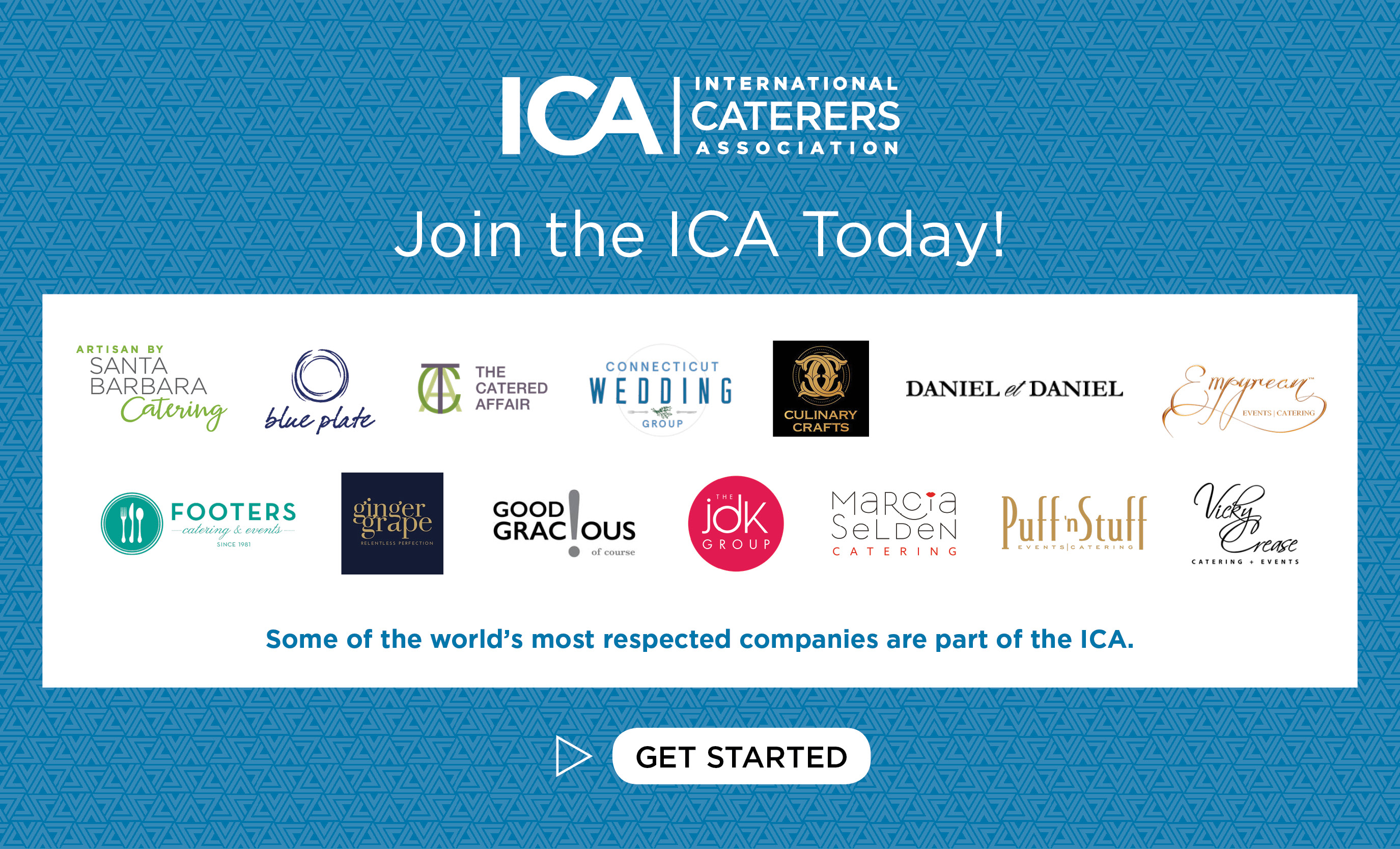Coronavirus - Helpful Resources for Caterers
Covid-19: Returning to a Mask-Free US Workforce? Not Quite Yet.
On May 13, 2021, the Centers for Disease Control and Prevention (CDC) issued new guidance, stating that individuals who are fully vaccinated against Covid-19 “can resume activities without wearing a mask or staying 6 feet apart, except where required by federal, state, local, tribal, or territorial laws, rules, and regulations, including local business and workplace guidance.”
CDC Guidelines are just that – Guidelines. They do not have the force of law unless adopted by a government body with legal authority. US employers must still follow Department of Labor, OSHA, EEOC and state and local laws and regulations. The article below from K&L Gates discusses these “exceptions” in greater detail.
Sharing COVID-19 Preparation Plans on Your Catering Company Website
Many caterers have opted to share their COVID-19 Preparation Plan on their website home page so that prospective clients know their plans to keep everyone safe.
|
Is Your State Taxing Forgiven PPP Loans?
State and Local Response Information
MultiStates Associates has created a googledoc that outlines all 50 states with the following information: Link to Heath Department COVID-19 Website, Key Contacts, Governments Plan to Reopen, State of Emergency Documents, Executive Orders, Session Changes/Capitol Changes, Travel Restrictions Information
Second Round PPP Dilemma
The first question one has to check into for the second round of PPP is, do you qualify for the program? The first test is black and white, and you have to meet one of two criteria.
- Your gross receipts in 2020 are down at least 25% compared to 2019
- Your gross receipts in one quarter of 2020 are down at least 25% compared to the same quarter in 2019
If you have made this cut: many business owners then face a more challenging and greyer decision. You have to sign that you need the money to support the ongoing operations of your business.
Interim Final Rule on Payroll Protection Program
The U.S. Small Business Administration, Department of the Treasury has released an Interim Final Rule on the Payroll Protection Program. It includes information on the Business Loan Program Temporary Changes, Paycheck Protection Plan - Revisions to Loan Forgiveness Interim Final Rule and SBA Loan Review Procedures Interim Final Rule.
A Guide to State Coronavirus Reopenings and Lockdowns
Many states are weighing how to ease weekslong restrictions on travel and business. Many states are lifting restrictions imposed to slow the spread of the new coronavirus. The Wall Street Journal shares what each state is doing. The article is updated frequently.
|
| |
OSHA Guidance on Preparing Workplaces for COVID-19
The US Department of Labor Occupational Safety and Health Administration (OSHA) has released a 35 page guide. The guide outlines steps all employers can take to reduce workers' risk of exposure to COVID-19.
|
Entry/Exit Tips from US Foods Blueprint
US Foods we'll show you how to change your entry path and establish 6-foot distances by creating turns to slow diners' pace, help them notice important signs, and demonstrate the right way to move through your space.
Read the following article that will give you the details on how to keep customers feeling safe in the new era of dining - from contactless delivery to tamper resistant packaging and more.
Get all the the right signage for reopening, from posters and banners to window, door and floor decals. Let your diners know you're open for dine-in, your operation is safe; and enforce social distancing.
|
The Event Safety Alliance (ESA) Reopening Guide for Event Professionals during COVID-19
The guide will go over the following items:
1. Planning when to reopen: when it's legal and reasonably safe
2. Patron Education
3. Worker Health and Hygiene
4. Sanitizing the Venue
5. Ingress and Egress
6. Front of House Circulation, Food and Beverage, and Merchandise
7. Production Issues and more
|
NEW Ecolab Reopening Resources
Return to Normal Operations Checklists: Recommendations at the restaurant level to help you make plans for resuming operations after a partial or full closure.
Update Cleaning Procedures: Expert procedures to ensure your locations are using the most up-to-date cleaning procedures for COVID-19.
Top Considerations Post-COVID: Guidance to help identify gaps and provide direction as you navigate reopening and returning to fully operational.
|
|
The Small Business Administration (SBA) Announces the Opening of its Paycheck Protection Program (PPP)
The Paycheck Protection Program (PPP) is an SBA loan that helps businesses keep their workforce employed during the Coronavirus (COVID-19) crisis.
Effective April 3, 2020, small businesses and sole proprietors can apply for and receive loans to cover their payroll and other certain expenses through existing SBA lenders.
The links below provide you with all of the information you need to begin the process.
|
Paid and Sick Leave Regulations
Under the FFCRA
Reminder: Families First Coronavirus Response Act (FFCA) went into effect on April 1, 2020.
The FFCRA, signed into law on March 18, created two temporary leave programs (Emergency Paid Sick Leave, EPSL; and Emergency Family and Medical Leave Expansion, EFMLE) that require private sector employers with less than 500 employees to provide leave to employees impacted by COVID-19. Under the law, covered employers qualify for 100 percent (full costs of both leave programs) reimbursement through refundable tax credits.
The U.S. Department of Labor Wage and Hour Division is responsible for implementing and enforcing new leave mandates enacted as part of the Phase II COVID-19 response bill. Click here for more information
|
|
COVID-19 Re-Opening Guidance
A Guide for the Restaurant Industry
The National Restaurant Association (NRA) has released a 10 page document providing re-opening guidance for restaurants.
|
Employees Refusing to Return to Work? The SBA Offers Some Protection of PPP Forgiveness
The SBA’s latest round of frequently asked questions (FAQs) about the Paycheck Protection Program (PPP) gives employers an important new tool to address one of the biggest challenges of trying to maximize PPP forgiveness: How to respond to employees who refuse to return to work by June 30, 2020.
|
|
CARES Act Tax Break Loses
The CARES Act temporarily rests the treatment of NOLs to pre-TCJA rules. You can now claim 100% of your net operating losses in 2020, 2019, or 2018, and carry them back for up to five years.
|
COVID-19 Reopening Economy Guidelines 4/28
The reopening of child care programs is crucial to helping parents and guardians return to work. Read the CDC's Interim Guidance for Administrators of US K-12 Schools and Child Care Programs.
|
|
Dramatic Rise in COVID-19 Related Scams
Below is a list of targeted topics that are susceptible to scammers right now:
- Protective Face Masks
- Illegal Online Pharmacies
- Supplements Marketed with Claims to Treat or Prevent COVID-19
- Home Test Kits
- Websites Flagged by Regulators
|
Staying Ahead of the Money Curve Updates
Ami Kassar, CEO of Multifunding LLC provides updates on Staying Ahead of the Money Curve with frequent posts on his blog.
|
|
Can the COVID-19 be spread through food, including refrigerated or frozen food?
According to the CDC, “Coronaviruses are generally thought to be spread from person-to-person through respiratory droplets. Currently there is no evidence to support transmission of COVID-19 associated with food.”
North Carolina State University has created an informational FAQ concerning off-premises foodservice during the coronavirus. At this time, there is no evidence that COVID-19 can be transmitted by food or food packaging. The FAQs are based on information from the Centers for Disease Control and Prevention, the Food & Drug Administration and the U.S. Department of Agriculture. (Source: NRA)
|
What other steps should we take to avoid infection?
The CDC suggests that people take the same steps they would to keep from getting the flu: get a flu vaccine, take everyday preventative actions – like washing your hands often – and see a doctor when you are sick.
Both the World Health Organization (WHO) and Occupational Safety and Health Administration (OSHA) have issued guidance for preparing a workplace for COVID-19 that include tips for preventing the spread of the virus and steps to reduce workers’ risk of exposure. And the CDC recently issued a strategy for implementing mitigation strategies for communities with local transmission. (Source: NRA)
|
|
Keeping American Workers
Paid and Employed Act
Below is the complete act, along with helpful resources that breakdown the act section by section.
|
Social Media Links
White House:
Youtube | Twitter | Facebook
US Department of Health and Human Services (HHS):
Twitter | Facebook
Center for Disease Control (CDC):
Twitter | Facebook
List of Antimicrobrial Products for
use Against COVID-19
On March 3, the EPA released a list of registered disinfectant products that have qualified under its emerging viral pathogen program for use again SARS-CoV-2. You can find the list here.
|
|
SBA Guidance for Businesses and Employers to Respond to COVID-19
Health and government officials are working together to maintain the safety, security, and health of the American people. Learn more about programs offered to assist and protect small business owners during this time. You can also view a guide on best business and employer practices to respond to the COVID-19 outbreak.
|
Managing Your Cash Flow During the Coronavirus (COVID-19) Crisis Presentation
In this presentation given by a keynote speaker, Ami Kassar, you will helpful information on how to plan and protect your business's cash flow during and after the COVID-19 pandemic. Find out about resources available to assist you and steps you can take to make sure that your business remains strong.
|
|
Sanitation Guide
This serves as a guide for best practices for Business Owners in the workplace during the COVID-19 pandemic according to the Centers for Disease Control (CDC) and the World Health Organization (WHO). You can also view latest news from the CDC to stay up to date with how the situation is evolving.
|
Facebook Small Business Grants
Facebook is offering $100 million in cash grants and ad credits for up to 30,000 eligible small businesses in over 30 countries where they operate. They will begin taking applications in the coming weeks. In the meantime, you can click here to sign up to receive more information when it becomes available.
|
|
Practical Tips from Nuphoriq
Nuphoriq is helping keep the catering community up to date regarding all things COVID-19. You can find tips on how to keep your business strong now and how to plan ahead for the future. You can sign up to receive breaking news alerts so you never miss a thing!
|
COVID-19 Official or Elected Representative Template Letter
The Federal Government has created a number of programs to help provide funding assistance for businesses across an array of industries. Your elected officials need to hear from the business leaders in the community about how COVID-19 has affected our business and what they can do to help. Click below to view a COVID-19 Official Elected or Represented Template Letter.
|
|
Cancellation Policy
View what other caterers are doing in regards to cancellation policies. Check back often as we add more catering company policies.
Letter to Catering Publications
This sample letter can be sent to catering publications to promote the catering industry.
|
Letter to Clients
Take a look at what other catering companies are sending to their clients.
|
|
Shared Work Programs
Many states are implementing "Shared Work" programs which help to prevent business downturns by providing an alternative to layoffs.
Below is the list of states participating in the program:
|
|
|
|
|
| Make sure to check your state's eligibility requirements. Click here to learn more about Shared Work programs. |
|
Join Today!
Develop...Connect...Maximize...Join Today!
Caterers
Who? A caterer member is a company that is either an off-premise or on-premise caterer. This is a group membership and up to 10 team members can receive exclusive ICA benefits. ICA's membership year runs for one calendar year from when you join.
Membership Fee: $425
|
Member Video

|
|
|
|

Who is the ICA for?
For motivated caterers, International Caterers Association is a resource that provides Education, encourages peer-to-peer Relationships, and Inspires creativity while embracing all segments of the catering industry.
 ICA members meeting up at Catersource. - be part of our family! ICA members meeting up at Catersource. - be part of our family!
What are the benefits of joining the ICA?
| |
 |
Free monthly webinars and access to industry operations information |
|
|
 |
Culinary Council and Mentorship Program |
| |
 |
Professional recognition in your business community |
|
|
 |
ICA Roundtable Facebook group
|
| |
 |
Special registration for members to Catersource and Art of Catering Food |
|
|
 |
Opportunities for education scholarships to Catersource and Art of Catering Food |
SB Value Group Purchasing Program: Join the largest purchasing program in the country with over 5 BILLION DOLLARS in purchasing power. No contract and no fees.
What does it cost to join?
The cost is $365 per year, that's just $1 per day!
But that's not all...
A membership is valid for up to 10 team members. That means your entire team can gain a wealth of knowledge from these exclusive benefits for just 10 Cents a day!
There is no other membership like this for caterers. The personal development that you and your team members will gain from this is priceless!
See what our members are saying...
|
2024 Board Candidates
All 2024 board candidates are listed alphabetically.
 Geoff Barker Geoff Barker
Vice President
Simply Fresh Events
Gaithersburg, MD
Resume
Geoff is the Vice President and co-founder of Simply Fresh Events, a full-service catering and event company based out of Gaithersburg, MD. Geoffrey has been in the catering business since 2005. He leads the sales team and manages our disaster catering division. Geoff enjoys creating special events of all types utilizing clients’ visions to create the perfect event. When Geoff is not working directly with clients he serves on the board at Nourishing Bethesda, a local non-profit focusing on food insecurity.
 Roe Chlala Roe Chlala
Principal/Creative Director
Alchemy Custom Celebrations & Cuisine
Norwalk, CT
Resume

Charlie Schaffer
Co-Founder and President
Schaffer
Los Angeles, CA
Resume
Charlie Schaffer is the Co-Founder and President of Schaffer, a Los Angeles-based, full-service event hospitality company. Charlie is a classically trained chef and a graduate of the Culinary Institute of America, where he earned an associate's degree in culinary arts and now serves in the Society of Fellows. He also holds a Bachelor of Arts in International Relations and Security Issues from the College of Charleston. He began his hospitality career working in some of the finest restaurants in New Orleans, like Brigtsen’s and Bayona. He went on to spend years working for master chefs Alain Ducasse and Lidia Bastianich in New York City as well as Pedro Subijana in San Sebastian, Spain. Charlie was chef de cuisine for Josephʼs in the Citarella group in NYC, and served as executive chef for Pinot Bistro with the Patina Restaurant Group in Los Angeles, CA. In 2008, Charlie and his wife Kathleen started Schaffer, an event hospitality company that brings all of the elements together for clients at their events by providing innovative and accomplished catering, service, production, and design. These clients recently include Moet/Dom Perignon, Paramount Studios, Lamborghini, BMW, Riot Games, Snap Inc., CBS, Disney, Pop Sugar, and Dell Computers, Amazon, Aston Martin and Versace.
 Syd Sexton Syd Sexton
CEO
Catering by Design (CO)
Denver, CO
Resume
Syd Sexton brings an extensive background in catering management. She spent 13 years with the Hyatt Corporation as Director of Catering where she participated on the corporate team to launch Hyatt’s off premise division, Regency Caterers. She then opened her own Denver catering company, Alex Brooks Fine Catering which she operated successfully for 15 years. She sold to business partners and returned to the hotel industry to join The Ritz-Carlton Hotel Company as the Colorado Area Director of Catering. Syd’s wealth of business acumen, along with her people management expertise, made her the perfect fit to guide the team at Catering by Design, Colorado where she has been the CEO since 2016. She holds a Bachelor of Science degree from the University of Houston School Hilton School of Hospitality Management. In 2020, Sexton founded and serves as immediate past president of the Colorado Event Alliance, a 501c3 whose mission is to assist special event industry frontline workers and small business owners through financial support and advocacy.

Christopher Villard
General Manager
Bold Catering and Design
Atlanta, GA
Resume
With over 30 years of catering & restaurant management experience, Chris Villard is part of an award-winning Bold Catering & Design team and serves as the general manager, where he applies his extensive hospitality career to create & execute some of the region's top events. After graduating with an MBA from the University of Florida, Chris kickstarted his career with various restaurant general manager roles throughout the Southeast. Soon after, Chris transitioned into the catering world where he spent nearly six years as Director of Operations for Charleston-based Duvall Catering & Events, followed by time as the Chief Operations Officer for Lisa Dupar & Company in Washington. Passionate about transforming people's lives through events, Chris loves to be part of Bold's flawless event execution team to help clients make everlasting memories one event at a time. Outside of work, Chris enjoys going to the gym, traveling & spending time with his family. |
|